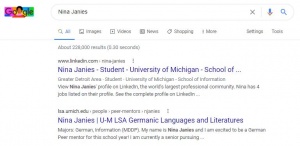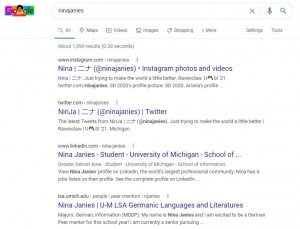Nina Janies
For as long as I can remember, my mother warned me that whatever I posted on the Internet created the identity that people would first discover me by and would never go away. Remembering that lesson from my childhood, I was and still am always careful about what I post online. That being said, another lesson I also learned is that the Internet is infamous for only showing the sides of people that those people want you to see, and unless the side you want people to see is the real “you,” you better post what you want “you” to be. With those lessons in consideration, it was of no surprise to me that my data identity was a reflection of lessons learned.
The identity that I have crafted online is one that is professional and reflects my achievements, and for the most part, is one I would be comfortable with potential employers and Internet strangers seeing if they were to look me up. This is intentional and has been carefully self-monitored as I have created my presence online. While this identity may not really reflect the “real me,” it is the “me” I want people to see when they Google my name. This is my ideal and perfect “Nina,” but as always, with something as massive and as invasive as the Internet, there were some slip ups, and these taught me another important lesson: you can’t control everything about yourself.
The Search
I started my search with two terms: “Nina Janies” and “ninajanies.” The first is obviously just my name, but I also chose to include the second search, which is my social media handle on most sites. I only used Google for these searches, but because my name is so unique, I didn’t have any challenge finding information about myself. In fact, almost every search result of the first few pages were about me -- I had done my job, I had designed exactly what I wanted employers and strangers to see.
The very first thing that comes up for “Nina Janies” is my LinkedIn. It clearly states that I am a student at the University of Michigan, and more specifically, in the School of Information. Next, is my other major: German. My peer mentoring profile comes up, and in the preview, explains that I am a Michigan Dual Degree Program student. Then, are my curriculars. I have robotics that I did in high school, and still volunteer for, the Theme Park Engineering Group at the University of Michigan, of which I am the President of, and then various school assignments and school-related articles I have been a part of. In short, it is almost a perfect depiction of the items I have on my resume, almost in the exact order I have them listed as well.
The search results for “ninajanies” weren’t that much different, but they did include my active social media accounts. The first results were my Instagram and my Twitter, both of which have also been carefully organized, and the rest on the first page were almost identical to the results for “Nina Janies.” However, it was on the second page that I noticed I had made a mistake: my old username was clearly listed.
This username, while not particularly embarrassing or bad in itself, could lead down a rabbit hole of my middle and high school self if searched for. So, I did just that. Looking up this name, the first results were not my LinkedIn or my Instagram, and they did not represent the online self I have worked so hard to create for employers and strangers to see. Instead, the first results were my cringy middle school Pinterest board, my Reddit account, my failed beauty blog, and most embarrassing, my One Direction fanfiction.
The Good and the Bad
It is obvious from my searches, that I have tried really hard to create my data identity in the last few years. Because my name really only yields results for myself, I quickly learned that whatever I posted using my whole name would come up as a top result. And with that in consideration, I was careful and conscious about what I used my full name for. But as a middle schooler, creating a username and social media accounts for the first time, and probably looking up to influencers a bit too much, I wasn’t too smart about my data identity. Back then, my middle school self had a desire to go viral in the fanfiction or beauty blogging world. I used an alias, my username, but I wasn’t smart enough to not link that username to the accounts I use today, and thus, a mistake was born.
But, the important thing today, is to remember that the Internet is forever, and try to forgive and forget -- or at least mitigate the risks associated with embarrassing material. The fanfiction, although embarrassing to me, probably wouldn’t be a huge problem with potential employers, and neither would the failed beauty blog or cringy Pinterest board. In fact, they may even find them funny or impressive, with my failed blog having 8,191 page views and my fanfiction having 20,463 reads. Regardless, this really isn’t so bad, and I have worked slowly to remove my true identity from these sites, or at least remove it from the basic search route of “Nina Janies” that most people would take.
So the Bad isn’t really so bad, and the Good shows what I want potential employers or Internet strangers to see. I have learned how to successfully manipulate Google’s search results to my advantage. But who is to say someone else couldn’t do the same?
Why the Good is Actually Bad
As I stated before, one of the lessons I learned was that individuals with an online identity have the ability to make themselves whoever they want to be online. As I searched myself online and found the mistakes, I also learned my follow up lesson: you can’t entirely control everything about yourself that appears. While these lessons contradict, they are both certainly true.
Having the ability to manipulate Google search results is potentially dangerous in itself. The Internet, and the people on it, have far more control over what you see online than you do. Everyday random people are doxxed and taken advantage of on the Internet. They don’t have to be famous and there are bad actors all over the place. These bad actors could be strangers who decided to “cancel you” or even ex-friends who don’t want to see you succeed. These bad actors can be just about anyone and they can do just as I have done. They can put your name in derogatory articles or even attribute an offensive post to your name. They can use you as a catfish and ruin the very name you have made for yourself. They can manipulate the Google search results in the worst way possible. While you have the power to try and hide these posts, just as I have tried with my fanfiction, they can still come up and this is the risk of the Internet.
Conclusion
Overall, the lessons I have learned are still the same. I am still and will continue to be careful about what I post online, but I can’t see the “real me” being exposed just yet, that is the intimate parts of my life I don’t want employers or strangers to see. As of now, I am also aware that what comes up is not entirely in my control. If I can manipulate my data, so can anyone else, and this is just the inherent reality of the Internet. And even for myself, where my own self interest is me and I show what I want people to see, the Good, and I have worked to reduce the embarrassments of my past, I still haven’t been entirely successful. So while my current data identity doesn’t show my true, authentic self, that’s okay with me, because at least it isn’t showing a version of me that I wouldn’t want others to see.

